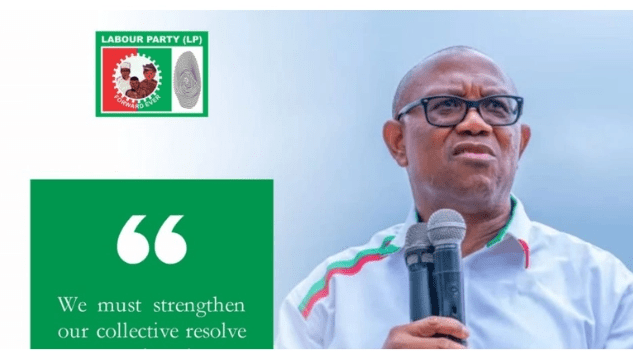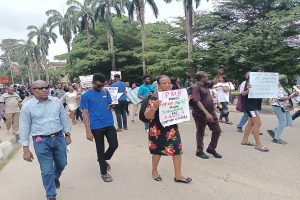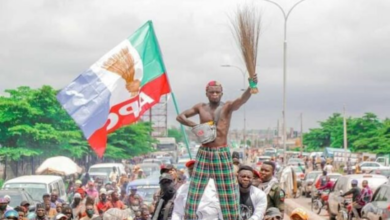We have questions for Peter Obi


By G9ija
The current “currency redesign” move by the Central Bank of Nigeria, under this gasping Buhari administration of the APC was clearly aimed to flush out currency warehoused by Nigerians, which is creating scarcity, and depressing the circulation of the Naira in the exchange system; and possibly bloating the Naira reserve and reducing its long term value, with a possible glut when it recirculates. Those are real dangers to the Money Market.
Of course, what the administration did was not to redesign the notes, but to change their colours. The intention was nevertheless, the same. But it was also one of those aspects of the fascist model of governance, which imposed the will of the state and its ruling oligarchy in order to annihilate its adversaries.
The policy which aimed to force out small cash holders, who have hidden their Naira under their beds, as well as traders, who have stocks of Naira kept outside of the formal banking systems indeed threatens the workers and the middle income folks.
In 1984, when Buhari, as military Head of State changed the currencies, the real victims were not the “big men” who had humongous cash squirreled inside bags and boxes in their wardrobes, it was the little Joe, who kept emergency family savings in the till beneath his bed.
Indeed, a certain Emir close to Buhari was allowed to bring in the famous 21 suitcases in the heat of that operations. Those will not suffer. His kind will survive. But why have Nigerians stockpiled or warehoused so much cash? There are of course, the politicians, who have stockpiled cash from their gypping the entire system for so long, and who have warehoused so much raw currency notes because they have no way of sending these billions.
They cannot place them in traceable accounts in local banks, else they will have questions from the EFCC. They cannot launder these cash caches quickly into Foreign currency either, because it would trigger an international crime alert. They do often buy up the dollars, and like the drug merchants of South America, build climate controlled barns for money that is difficult to spend.
There are many business men who have, because of the loss of investor’s confidence in the Nigerian economy, as a result of the Buhari administrations incompetent management of the Nigerian economy, have been forced to keep their reserves in foreign currency, which are also warehoused. I mean both the local and the international investor has lost confidence in the Nigerian economy, and investing in Nigeria is like a game of chance.
There are no guarantees. No security. Some of the direct impact of this large scale withdrawal of money from the system, has been in the warehousing of inert currency which has no investible outlet or dynamic value. It is the capital trap.
Between the large scale evacuation of Nigeria’s resources overseas with the resulting impoverishment of Nigerians, and the warehousing of money, often stolen from the Nigerian public treasury, the Nigerian economy experiences the lack of Capital flow that could energize its local economy; create fluid funds for large scale and middle scale borrowing that could stimulate new industries and production hubs.
But the useful policy might not in the end be to prevent these funds trapped in private garages, and sink holes and wardrobes, and even suck-aways, from re-entering the National exchange circuit, because the new currency design might make it difficult to mop nearly 70% of these warehoused currencies back into circulation, and even if it does get mopped, it might lead to a collapse of value of the Naira as a result of currency glut.
But the best policy might be to design some mechanism to get the warehoused money, originally stolen from Nigerians, to re-enter the Nigerian economy as investible funds. Money is warehoused because it has no place to go.
This is the challenge which I was hoping that Peter Obi might want to address as part of his monetary policy. I speak particularly about Peter Obi because I think he has momentum. I watched his town-hall event alongside his vice-presidential candidate, Dr. Yusuf Datti Baba-Ahmed, on the Kadaria Ahmed Show on NTA.
The first thing that struck me was that Peter Obi has not yet clearly, fully, and unambiguously established what he would provide as alternatives to the withdrawal of the Petroleum subsidy, which he has rightly committed to ending, because as he equally rightly noted, the current regime of subsidy is a “criminal enterprise.”
There is no question about that. But I frankly think that Mr. Obi should be able at this point, to have thought through the implications, and provide the well-thought, very clear alternatives, particularly given the long term position of the Labour Party on which he is running about these subsidies.
Clearly with Peter Obi, Labour has shifted from its long held policy on subsidy. To that effect, the leadership of the Labour Party must now present the Nigerian workers and peoples, the clear picture of their current party policy. It feels dodgy.
What will money saved from the ending of subsidy be directed towards? Since Petroleum subsidy was originally aimed at alleviating the conditions of the workers and middle class Nigerians, would Peter Obi’ administration consider developing a modern, clean, efficient, properly run National Transport system using the multi-modal platform: clean and efficient city and rural bus services; an efficient well-run, well-designed National Railways grid; an Inland Waterways system, and a properly run National Airways? Sixty percent of the income of the average Nigerian is expended on transportation.
An efficient, publicly run National transportation system, could be an alternative program that might justify the removal of direct subsidy. A federal-state-and local government partnership, that could also pull in private investors might be the way to go. I was equally startled by Yusuf Baba-Ahmed’s response to two critical questions: one, is on the ownership of a “Private University” and the potential conflict of Interest that might arise with his position as Vice-President, and the second is on the ideological position of the Labour Party as a Socialist Party. What are two market-oriented candidates doing at the helm of the Labour Party? Yusuf Baba-Ahmed’s position was puzzling, at best.
Yusuf Baba-Ahmed has been described as an Economist. I must confess that I have not read any papers on the Economy that he has published, either in an academic journal, distinguished or not, or even in the popular public media. So, I’m not able yet to read the tea leaves on him.
But I do know that he is associated, as President of the Private Baze University, with some level of education administration.
If he is to be taken seriously, and the laws might have said so already, he must resign and dispense with all his interests in this private institution because it will have serious conflict of interest dimensions if he becomes Vice-President. Besides, the Obi Campaign must come up with exactly how they intend to reform, reposition, and restore the Nigerian public university system beyond making it just a “wish list.”
One of the greatest policy errors of the Obasanjo regime, in my view, was to license the “private Universities” in Nigeria, without strategic impact assessment, and without serious ethical, organizational and procedural considerations. No individual should “own” a “Private University.” The Private University must be managed by a non-profit Trust, and not by an individual. An individual may endow the university, but may not “own” it.
This is how “private” Universities like Harvard or Stanford, etc. are organized. They are not “private” Universities because they are owned by individuals, but by established non-profit trusts and corporations that do not depend on public funding. The next National Assembly must correct the conditions for the charter of these “private” universities, because funded publicly or privately, universities must still operate within the laws of Nigeria, and within its highest national interest. Universities are not just where you train highly skilled manpower.
But because of their status as centers for conducting complex, and sometimes even secret and possibly dangerous research, they are inexorably linked to the National Security system of a nation. How does a Peter Obi administration intend to fund Nigeria’s public universities to make them become first class, productive places of learning and research that could help reposition Nigeria as a highly productive nation; and attract international attention and regard.
How will Obi’s administration rebuild these once highly valued National universities to educate a new generation of Nigerians, to begin to reimagine Nigeria as a great possibility, and who should no longer need to seek education in “foreign Universities”? What is to be done? How much is the cost projection? And what is the projected funding source? These have to be made clear, with clear-cut numbers, by the Peter Obi Campaign.
Peter Obi’s deputy says Labour is not a “Socialist party” but a “Welfarist Party.” Fair enough. But I would like to complicate this issue a bit, of the current Labour Party’s position on Welfarism, and the ideological conflicts that are likely to ensue if Center right conservatives like Peter Obi, and Dr. Yusuf Baba-Ahmed form the next government.





